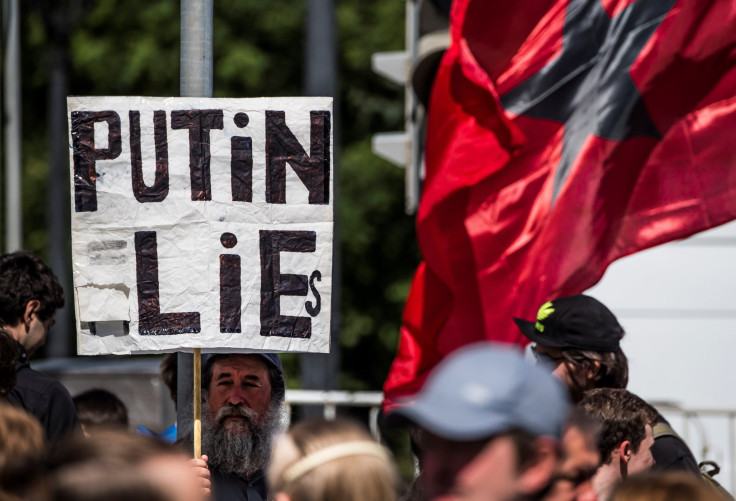Russian Protester Arrested For ‘Putin Lies’ Sign After Parliament Bans VPN

A Russian man, carrying a sign that said, “Putin Lies,” was arrested in Moscow, Sunday during an organized protest against the restrictions placed on online freedom of speech by the Russian Parliament. He was later released without charge by the Tverskoy police department, according to the Russian news outlet OVD Info.
Russia’s Duma (lower house of parliament) passed a bill on Friday that prohibits the use of proxy servers, including virtual private networks (VPNs), when people browse the internet.
VPNs allow people to access the internet anonymously without being detected or having their IP addresses recognized from any location of the world. The bill is awaiting the signature of Russian President Vladimir Putin to become official law. People claim that it is a violation of their right to free-speech in the digital world.
To express their opinion against the same, hundreds of people took to the streets of Moscow two days after the bill was passed, in an organized and pre-approved protest. The protester among the crowd of demonstrators who held up the anti-Putin sign was identified as activist Gregory Saksonov according to an Independent report.
Read: Why Russia Is Concerned About Ukraine Joining NATO
The photograph seen below is of a protester holding said sign in the Freedom of Speech rally in Moscow, but there is no confirmation that the person seen in the picture is Saksonov. It is not known whether there was more than one protester who carried similar signs either.
Another protester Ruslan Ivanov had his leaflets expressing support for opposition leader Alexei Navalny confiscated after he was taken into police custody. He was released without charge as well.
Read: Emails Show Possible Ties Between Kaspersky Lab, Russian Government Agencies
"Russia's authorities are leading an assault on free expression," Yulia Gorbunova, a Russia researcher at Human Rights Watch (HRW), an American-founded international non-governmental organization that conducts research and advocacy on human rights, said on July 18.
"These laws aren't just about introducing tough policies, but also about blatant violation of human rights," she said.
Gorbunova further added: "The Russian government effectively controls most traditional media, but independent internet users have been openly challenging the government's actions. The authorities clearly view independent online users as a threat that needs to be disarmed.”
HRW has interviewed more than 50 lawyers, journalists, editors, political and human rights activists, experts, and bloggers and their family members, to find out their views on the diversity of content available on the internet and on their freedom of expression. The organization says the Russian government is trying to curb public debate by denying anyone who is dissatisfied with the ongoing economic crisis, or critical of Russia's foreign policy, the opportunity to speak out, under the pretext of enforcing anti-terrorism laws.
“We have dozens of cases where people were literally sent to jail,” Andrei Soldatov, an investigative journalist and expert on internet freedom in Russia, told Human Rights Watch. “That, of course, has its effect on the level and freedom for political and public debate in social media,” he pointed.
© Copyright IBTimes 2025. All rights reserved.





















